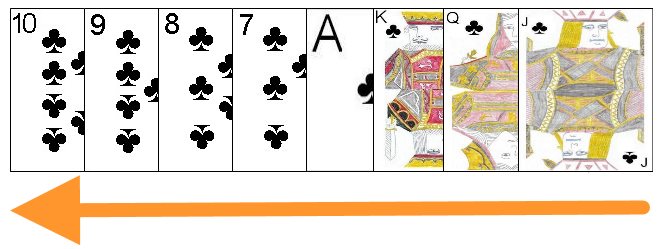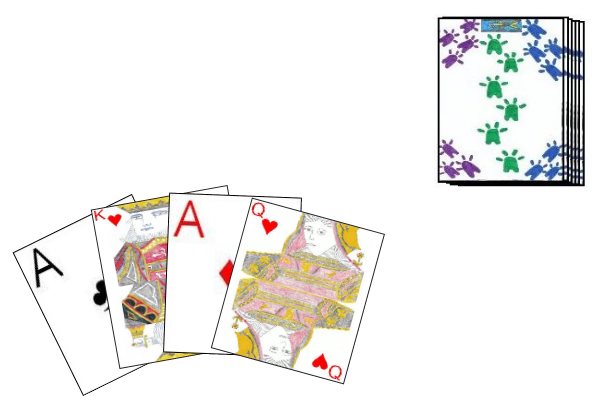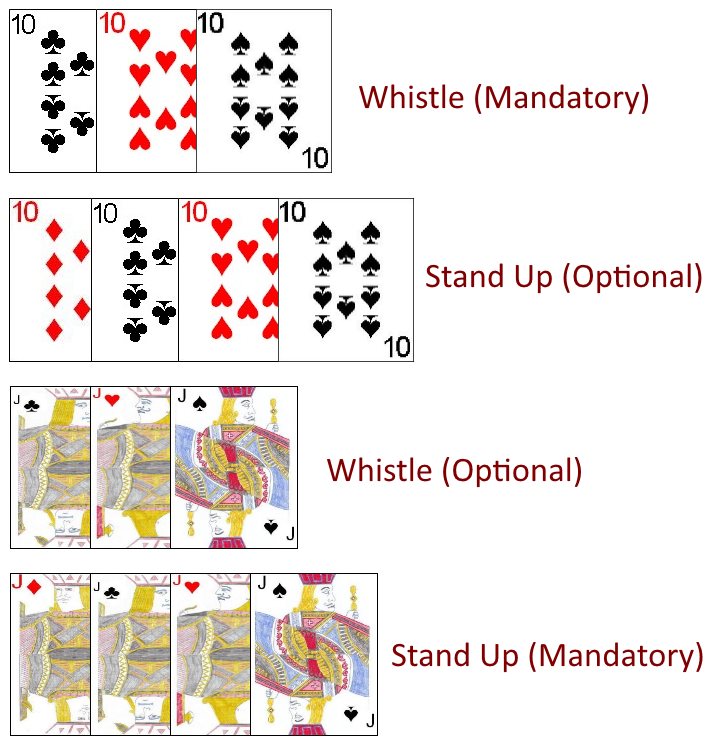The game uses a 32 card deck, which is created by removing all the cards from a regular deck save all Sevens, Eights, Nines, Tens, Jacks, Queens and Kings. The ranking of these cards as used in Toepen is somewhat unusual, with the following ordering from highest to lowest; 10, 9, 8, 7, Ace, King, Queen, Jack.

Selection of seating positions and the first dealer can be performed using a variety of methods, with a draw for low cards common. If drawing for low cards and multiple players draw cards of the same denomination, those players must redraw until every player has drawn a card of a unique denomination. Once the players are seated and the first dealer selected, the dealer should thoroughly shuffle the 32 card deck and offer it to the player at his right for the cut. After the cut, the dealer begins dealing the cards, one by one and face-down in a clockwise rotation starting with the player at his left. He continues dealing in this manner until each player has a total of four cards. He then places the remainder of the deck in a face down pile in the center of the pile. Each player would then pick up his hand to examine it. In addition, at the start of a game, each player is provided 9 chips or tokens (called lives).
 After the players examine their hands, every player has the option to exchange his hand for a new hand dealt from the top of the deck. He does this by discarding his four cards face-down to the center of the table and dealing himself four new cards from the top of the deck. Normally, a player is only entitled to do this if his hand consists solely of Aces, Jacks, Kings and Queens. However, a player with any hand may attempt to exchange his hand, but is liable to be challenged by another player. If any player so challenges a player performing such an exchange, the discard hand is turned over to determine the cards comprising the hand. If the discard hand is found to contain any 10's, 9's, 8's or 7's the player attempting to exchange the hand loses one of his tokens, but is still entitled to keep the new hand. If the hand is challenged and is found to only contain Aces, Kings, Queens, and Jacks, the challenger loses one of his own tokens instead. A player may not exchange his hand a second time on that same hand, even if the second hand only contains Aces and court cards. A player is never required to exchange his hand even if the hand qualifies for an exchange. If there are not enough cards remaining in the deck for a player to exchange his hand, he must keep his original hand, even if he would normally qualify for exchange.
After the players examine their hands, every player has the option to exchange his hand for a new hand dealt from the top of the deck. He does this by discarding his four cards face-down to the center of the table and dealing himself four new cards from the top of the deck. Normally, a player is only entitled to do this if his hand consists solely of Aces, Jacks, Kings and Queens. However, a player with any hand may attempt to exchange his hand, but is liable to be challenged by another player. If any player so challenges a player performing such an exchange, the discard hand is turned over to determine the cards comprising the hand. If the discard hand is found to contain any 10's, 9's, 8's or 7's the player attempting to exchange the hand loses one of his tokens, but is still entitled to keep the new hand. If the hand is challenged and is found to only contain Aces, Kings, Queens, and Jacks, the challenger loses one of his own tokens instead. A player may not exchange his hand a second time on that same hand, even if the second hand only contains Aces and court cards. A player is never required to exchange his hand even if the hand qualifies for an exchange. If there are not enough cards remaining in the deck for a player to exchange his hand, he must keep his original hand, even if he would normally qualify for exchange.
After each player has an opportunity to exchange his hand, play of the hand begins. The player to the immediate left of the dealer begins by leading any card from his hand to start the first trick. Each remaining player, in a clockwise rotation around the table then plays one card from his own hand to the same trick. A player must play a card of the same suit as led to the trick if he has such a card. If not, he can play any other card from his hand. Once each player has played one card to the trick, the winner of the trick is determined. The player of the highest card of the suit originally led to that trick wins the trick. The cards from that trick are set aside, face-down out of play and the player who won the last trick leads any card remaining in his hand to the next trick.
This continues until all four tricks have been played and won. Points are scored in this game based on the winner of the last trick. Each other player except the winner of the last trick loses one of his tokens, which are set aside out of play. The winner of each hand is set as the dealer for the next hand.
Toeping: Any player, at any time during the play of the hand may opt to Toep. Doing so is an offer to increase the number of chips that will be lost by all the players during the hand by one unit. This is usually indicated by the player knocking audibly on the table. When any player Toeps, play pauses for a moment and all the other active players have the opportunity to drop from the hand or remain. If a player opts to drop, he loses a number of tokens equal to the value immediately before the current Toep. If he remains in the hand, he continues playing with the risk of a higher penalty if he does not win the last trick of the hand. There may be any number of Toeps on a hand, but a player may not knock twice in succession on the same hand, needing to wait until another intervening player Toeps before the original Toeper can Toep again. If, after a knock, everyone drops except the Toeper, the Toeper automatically wins the hand loses no tokens. If the player who would have the lead to the next trick drops due to a Toep, the lead passes to the next player in turn after that player. A player may not Toep if his Toep would cause him to lose more chips than he currently has remaining.
If a player loses his last token during the game, he must drop from the game. The last player with tokens remaining has won the rubber. A new rubber is then started with each player starting again with nine tokens.

Special Actions: There are several special actions that must be performed by players who are dealt certain hands. The following are these necessary actions and the cards which a player would hold to require that action:
- A player who in his hand has Three tens must whistle. If unable to whistle, he must sing loudly.
- A player who has three Jacks has the option to whistle (as would a player having three tens) but is not required to. If unable to whistle he may sing loudly instead.
- A player who has four tens in his hand must stand up from the table.
- A player who has four Jacks has the option to stand up (as would a player who has four tens), but is not required to.